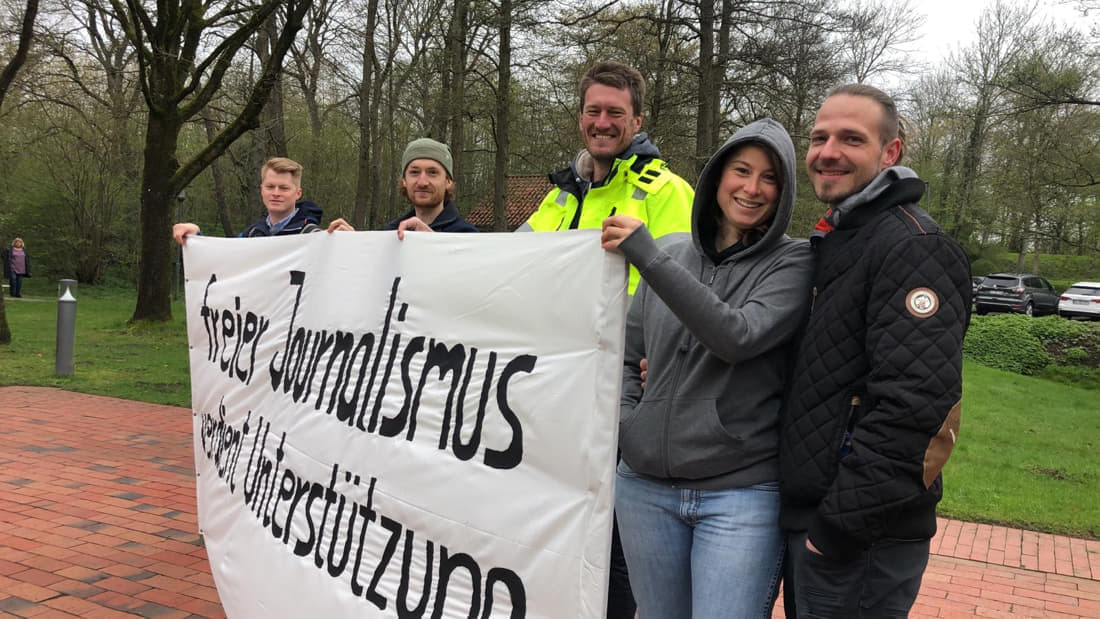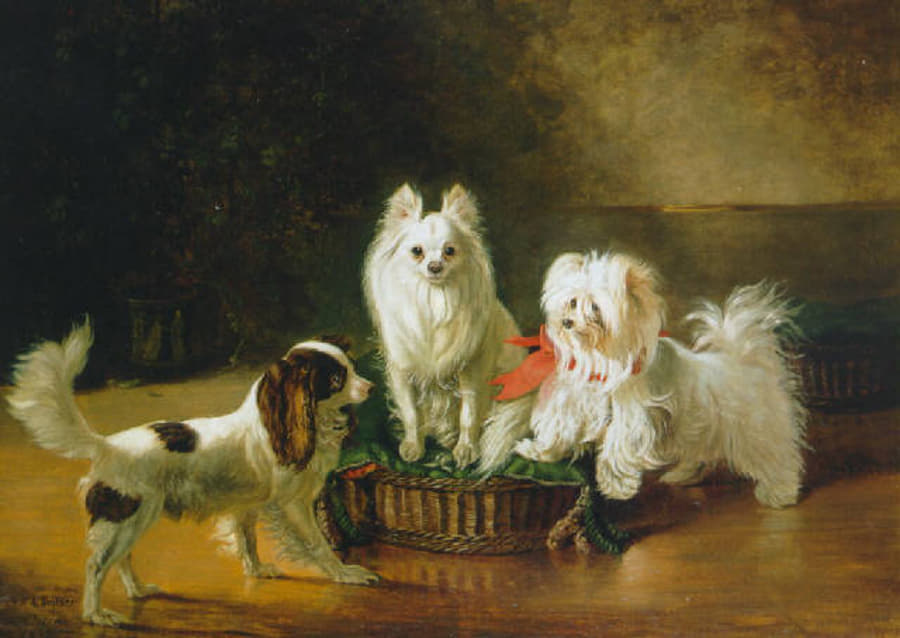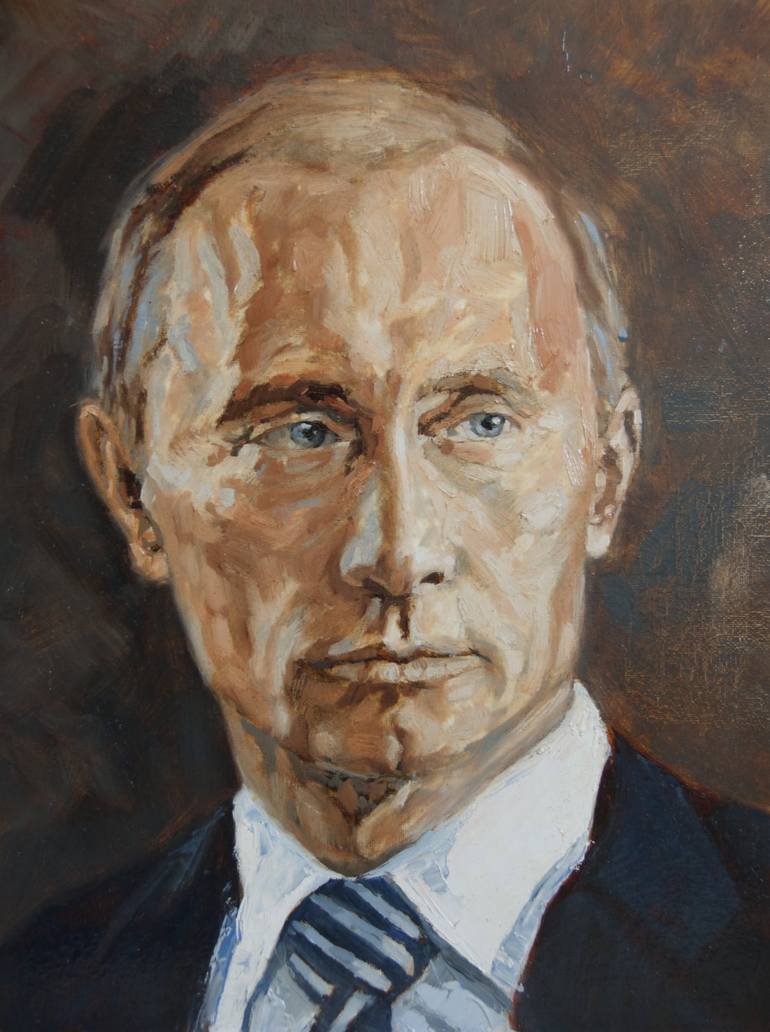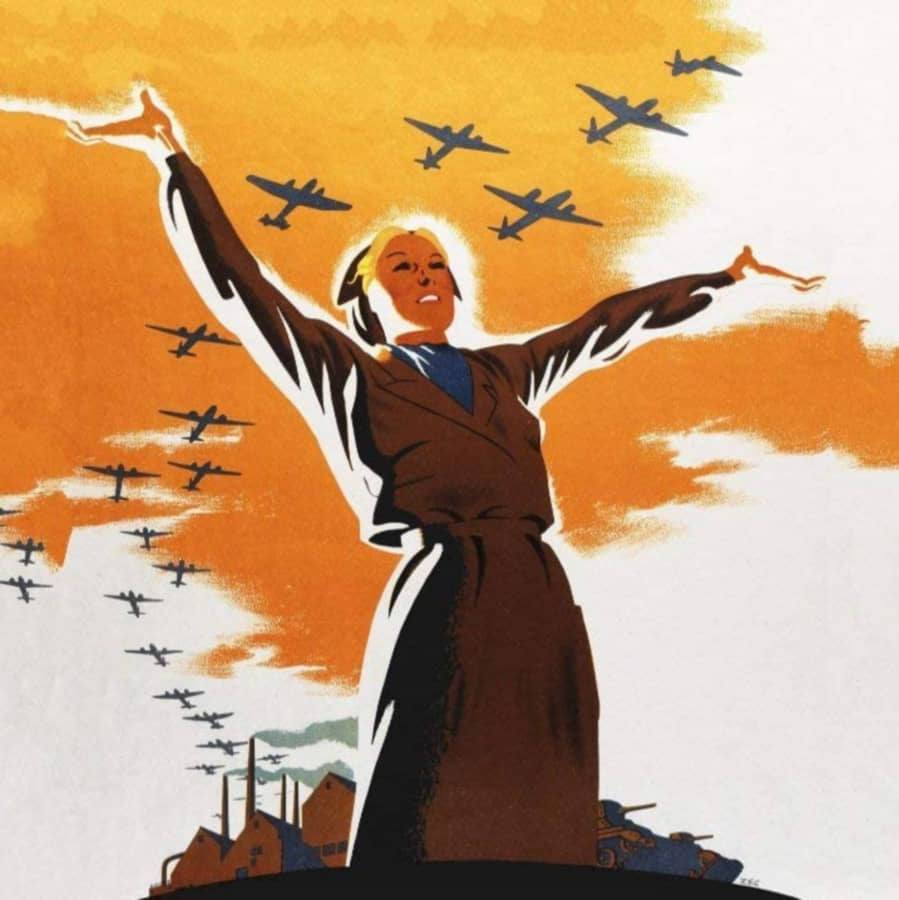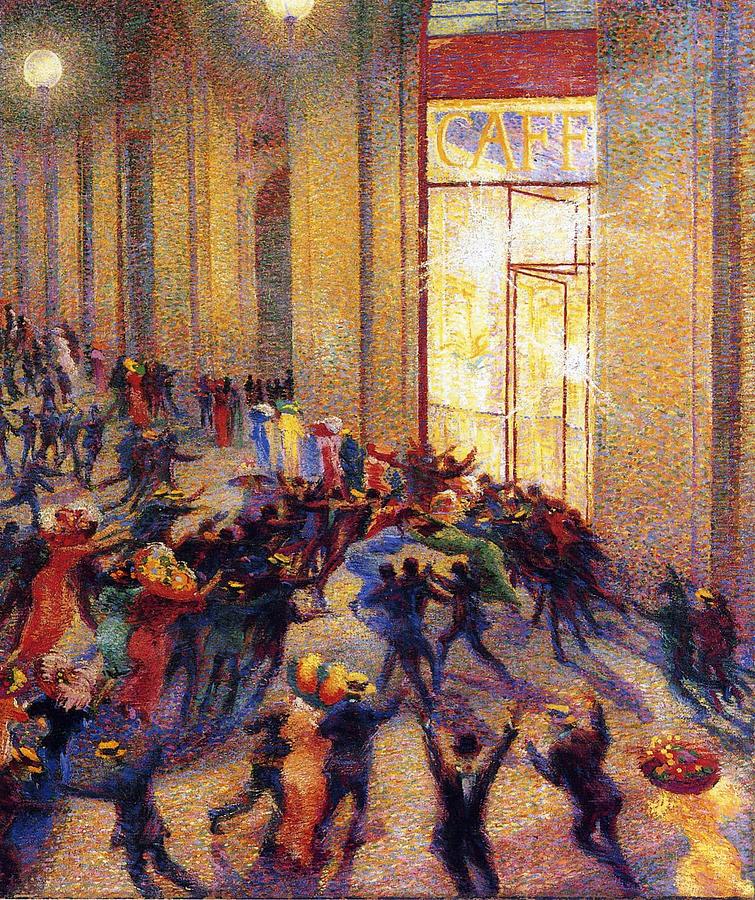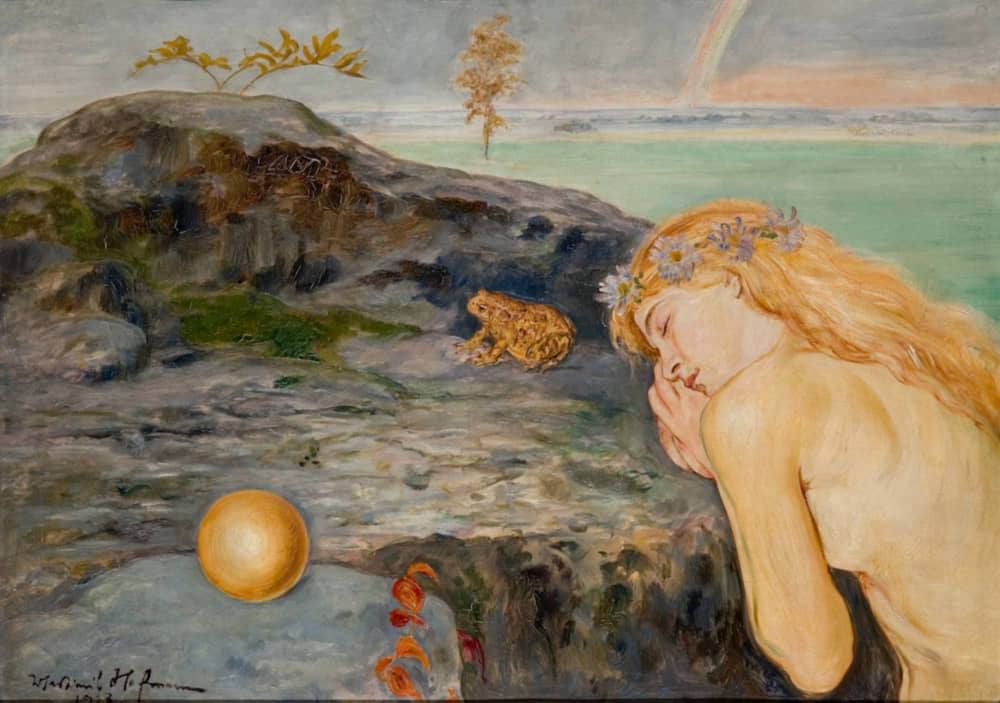A lost generation? Are today’s 20-year-olds all without a backbone? Journalist Patrik Baab disagrees. Students supported him in his legal dispute with Kiel’s Christian-Albrechts University. This did not go down well: an open letter was not allowed to be sent via the university distribution list. But the students didn’t give up up. A positive experience. The CAU had terminated Baab’s teaching contract because of his research in the Donbass. On April 25, the Schleswig-Holstein Administrative Court ruled that the termination was illegal. The ruling is not yet legally binding.
Nimble hands dipped brushes into pots of paint. On a banner, lying on the ground, they wrote out red letters. Faces could not be seen. But the slogan was soon visible: “Solidarity with Patrik Baab.” A few more hands hung the banner on the bicycle bridge over Olshausenstrasse at Kiel University. After the night-and-fog action, it remained there for days. In mid-February, students took their protest against censorship and restrictions on freedom of the press to the streets—and to the Internet: a video of the action went viral. The reason: After research in the Donbass and a press campaign, my teaching assignment for practical journalism was cancelled. As an eledged election observer, I would have legitimized Putin’s “sham referendums” and thus the “Russian war of aggression.” No one bothered to check if this was actually true or not. It was just more jumping on the bandwagon—for clicks and advertising revenue. The fact that the majority of people in the Donbass actually think of being pro-Russian does not fit in with the West’s propaganda.
(See, “The Donbas Rift,” by Serhiy Kudelia, and Frontline Ukraine: Crisis in the Borderlands, pp. 156ff).
On Good Friday 2023, my friend Friedhelm, his daughter Luise and I wanted to have a nightcap in the Kiel pub, Palenke, around 10:30 PM. The waiter came up to me: “Mr. Baab, you are a conspiracy theorist. You won’t get any beer here. Leave the pub immediately!”
Appalled, we left. Luise commented, “This is how I imagine 1933!” Reason enough to wash down our horror elsewhere. Conspiracy theorist; lateral thinker; Covid denier; right-wing extremist; Putin legitimizer; anti-Semite: These are the denunciation labels of the ecolibertarian and national reactionary bourgeoisie. They serve to enforce propaganda, to exclude dissidence, to divide the population, to destroy the existence of the target, to force anticipatory obedience by generating fear. Behind it all is one goal—to secure the rule of the power elites. But these campaigns are orchestrated by their academic and journalistic satraps. The waiter at the Palenke is named Moritz, studies at Kiel University and works at the campus radio station.
It is precisely against this “Cancel Culture” that students at CAU are now standing up. They are not alone: At Prof. Ulrike Guérot’s “conciliation hearing” before the labor court on April 28, about 100 students demonstrated against her dismissal by the University of Bonn; Prof. Michael Meyen, who is being dragged through the mud by the Süddeutsche Zeitung in particular, also finds support among many students and staff at the University of Munich. It is still a minority that is fighting against the anti-democratic rallying movement of media like T-Online, universities and state-supported denunciation platforms like Zentrum Liberale Moderne, Amadeu Antonio Stiftung or the Mobile Counselling Team against Right-Wing Extremism in Hamburg. But every day there are more of them. Because they know: These witch hunts are not about arguments, but about power. It is about using anti-democratic means to enforce the dominance of discourse. At Kiel University, too, the democratic culture of debate has collapsed—an alarm signal for universities, had it not been for the fact that the lecture halls have long since been colonized by a morally armored extremism of the ecolibertarian center.
But soon the witch hunters could become the hunted. Because now there is the working group “Dialogue on Fundamental Rights and Health Protection” at CAU. Founded in February 2022, it officially has ten active members. One of them is Julian Hett: “Unofficially, we are a lot more, because graduates remain loyal to the group. The community is much larger, maybe a hundred young people in Kiel alone. Our first topic was Corona – and what state organs took out during that time. The Covid measures at Kiel University were also completely disproportionate.” It didn’t stop at Covid. The Covid measures were only one step in the continuing attempt to impose authoritarian structures. Kiel University is part of an unfortunate tradition: Hooray-patriotism in lecture halls in 1914; academic Freikorps during the Kapp-Lüttwitz Putsch in 1920; “Sturm-Uni” of the Nazis from 1933; secret service involvement of professors during the Cold War and afterwards.
(“Sturm-Uni,” or “Sturm-Universität,” literally a “Stormtrooper university,” is a term from the Nazi-era, which simply means a university entirely aligned with, commited to and thus promoting state ideology—Ed.).
The students of the Arbeitskreis Grundrechteschutz (Working Group for the Protection of Fundamental Rights) know this, and they know what it’s all about. That is why they are organizing a solidarity event for me. On April 11, my lawyer Dr. Volker Arndt and I spoke in front of more than 100 people. In the home of the Kronshagen sports club, there was enthusiastic applause and more than three hours of critical debate about media, propaganda and the Ukraine war. Reason-led discussion against cancel culture and irrationalism, entirely in the spirit of the Enlightenment, as Immanuel Kant wished: “The critical path alone is still open.” For this, the Working Group booked a room, distributed flyers, put stickers on lamp-posts, and uploaded a recording on the web. Anyone who has ever done something like this knows that all this is no small feat.
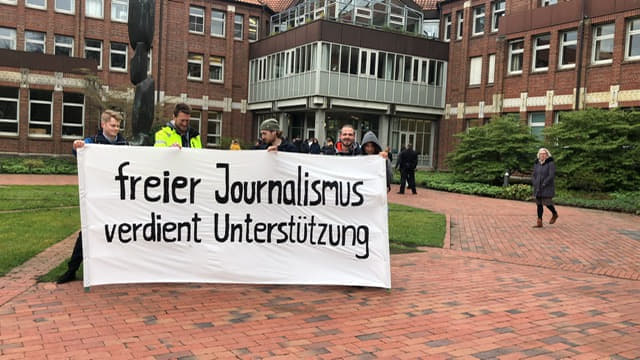
The commitment of the Kiel students reminds me of my own beginnings—in the alternative newspaper movement at the end of the 1970s. With the founding of the Provinzblatt Homburg (Homburg is a small city in the southwest of Germany) , we wanted to take a stand against the machinations of the local construction lords and the one-sided reporting of the monopolist Saarbrücker Zeitung. The success remained modest—but nevertheless a circulation of 800 copies. At the meeting of alternative newspapers in Freiburg im Breisgau in 1977, those who later promoted the founding of the Taz (Die Tageszeitung) came together. They met again at the peace demonstration in Bonn’s Hofgarten in 1981. Six years later, they were joined by participants in the Olof Palme Peace March in the GDR. The central demand: a nuclear-free zone in Central Europe and a press oriented toward the interests of the people—demands that are still highly topical today.
The Provinzblatt Homburg has long since ceased to exist. But back then we were able to learn to stand when the wind was blowing against us. I have remained true to my ideas from back then: The power elites must face criticism; research is an oppositional concept. I offered a seminar on this at the CAU; something obviously stuck with some of the participants. The Taz is quite different: The paper has degenerated into a mouthpiece for the ecoliberal elites. Thus, Esther Geisslinger also joined in the campaign against me and called me a “Putin propagandist.” For more than 20 years I have been critically examining Putin’s Russia. These films are online. But Ms. Geisslinger apparently can’t even manage to use a search engine or listen in a courtroom. My lawyer forced the Taz to publish a counterstatement. The lying press—the students in Kiel are also mobilizing against this.
Journalist Thomas Moser did a reality check and wrote: “The treatment of NDR reporter Patrik Baab by universities and the media shows how deeply divided Germany is and how ruthless it is when militarized nationalism spreads.” Like the students from the Working Group, he speaks of an attack on the freedom of the press. He says, “This is a culture war. It has to be fought out now. It’s about preserving democracy. That’s why we need a new 1968, a new extra-parliamentary opposition.” But the mood among fellow students is divided. In Kiel, the campus radio and the student newspaper, Der Albrecht, are more on the identity politics trip. There, the right attitude apparently counts more than a researched reality check. Sociologist Oskar Negt had this to say about such attitudes: “Opportunism is the real mental disease of intellectuals.” A disease that is also widespread at Kiel University.
“A whole generation is missing,” I hear the peace movements of yesteryear, those who have long since turned gray, lament. But who educated this generation to conform? Who pushed through the Abitur after eight years? Who pushed for the restructuring of university courses? Who purged the content of critical questions and introduced multiple-choice exams in social studies? It was us—today’s 60-year-olds. Gustav Heinemann, the third German president, once said: “Those who point at others with their index finger are pointing at themselves with three fingers of their hand.” But is an entire generation really missing?
No. The oral court proceedings show the opposite. In front of the Administrative Court in Schleswig on April 25, flags and banners: “Free journalism deserves support.” A signpost at the CAU in Kiel—”Pluralism of opinion”—deleted. Twenty-five supporters in the hall, half students of Kiel University. “We rarely have that at the administrative court,” says the chairman of the chamber, Dr. Malte Sievers, “but here fundamental rights are also weighed against each other.” Meanwhile, in an editorial office I know, the internal word is, “We ignore that!” The entire misery of the self-proclaimed quality media is bundled in these three words. The press, which had already disgraced itself in tendentiously covering the demonstration by Sarah Wagenknecht, of the party “Die Linke,” and the publicist of the feminist magazine, Emma, Alice Schwarzer, for peace talks to stop the war in Ukraine, on February 25 in Berlin, continues to disgrace itself. The students from the Working Group are therefore also concerned with counter-publicity—against the manipulative of the established public spheres. This is reminiscent of the “Stop Springer” campaign in 1968 (a campaign against the Murdoch-like German media tycoon Axel Cäsar Springer and his press empire).. So, a touch of APO after all?
For that to happen, the few would first have to become the many. The ground is prepared for this: The sanctions against Russia and the accompanying inflation are impoverishing large parts of the population. Gradually, even many younger people are realizing that Germany could be drawn into a war in which there is much to lose but nothing to gain. The propaganda of the bellicose elites becomes all the more vehement. It is a “drastic reminder,” says Noam Chomsky, “that the arena of rational discourse collapses precisely where there should be hope that it will be defended.” That is, in academic circles.
Whether Kiel University has the strength to put its reputation as a “storm-trooper university” behind it this time—I have not yet formed a final judgment on that. But it is a signal that the students are taking the protest to the streets. Because—as in 1976 when the so-called anti-terror laws were introduced—it is about defending the republic—against an academic-media-political complex that wants to drive the country into a post-democratic elite-rule and new wars. The weapons of counter-Enlightenment are far from being blunted—not even at universities. That is why the Working Group for the Protection of Fundamental Rights is planning further actions. The fight goes on. For me, the support of “my” students is important. Thank you for that!
